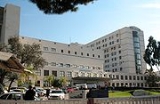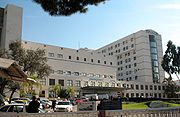
Health care in Israel
Encyclopedia

Israel
The State of Israel is a parliamentary republic located in the Middle East, along the eastern shore of the Mediterranean Sea...
is universal
Universal health care
Universal health care is a term referring to organized health care systems built around the principle of universal coverage for all members of society, combining mechanisms for health financing and service provision.-History:...
and participation in a medical insurance plan is compulsory. Health care coverage is administered by a small number of organizations, with funding from the government. All Israel
Israel
The State of Israel is a parliamentary republic located in the Middle East, along the eastern shore of the Mediterranean Sea...
i citizens are entitled to the same Uniform Benefits Package, regardless of which organization they are a member of, and treatment under this package is funded for all citizens regardless of their financial means. According to a 2000 study by the World Health Organization, Israel has the 28th best health care in the world.
History
Starting with the British mandate of PalestinePalestine
Palestine is a conventional name, among others, used to describe the geographic region between the Mediterranean Sea and the Jordan River, and various adjoining lands....
in 1917, measures were taken to improve public health in the area. In Jerusalem, accumulated garbage heaps were removed, public trash cans were installed; the entire population was vaccinated against smallpox
Smallpox
Smallpox was an infectious disease unique to humans, caused by either of two virus variants, Variola major and Variola minor. The disease is also known by the Latin names Variola or Variola vera, which is a derivative of the Latin varius, meaning "spotted", or varus, meaning "pimple"...
, and pools and cisterns were covered with mosquito repellent as part of the campaign to eradicate malaria
Malaria
Malaria is a mosquito-borne infectious disease of humans and other animals caused by eukaryotic protists of the genus Plasmodium. The disease results from the multiplication of Plasmodium parasites within red blood cells, causing symptoms that typically include fever and headache, in severe cases...
.
The public health care system in Israel was built on foundations of the system introduced during the British Mandate. Health insurance is administered by the Health maintenance organization
Health maintenance organization
A health maintenance organization is an organization that provides managed care for health insurance contracts in the United States as a liaison with health care providers...
s ' onMouseout='HidePop("49563")' href="/topics/German_language">German
German language
German is a West Germanic language, related to and classified alongside English and Dutch. With an estimated 90 – 98 million native speakers, German is one of the world's major languages and is the most widely-spoken first language in the European Union....
Krankenkasse), most of which were set up by the labour union
Trade union
A trade union, trades union or labor union is an organization of workers that have banded together to achieve common goals such as better working conditions. The trade union, through its leadership, bargains with the employer on behalf of union members and negotiates labour contracts with...
s before the founding of the State. These Health Maintenance Organizations are membership-based. Originally, the members paid membership fees to these funds , and received in return a set guarantee of health services.
In 1973 a special law was enacted which forced all employers in Israel to participate in the medical insurance of their workers, by means of a direct payment to the Health Maintenance Fund in which the workers were members. The duty of participation was eventually changed and diminished as part of the arrangements law (חוק הסדרים במשק המדינה) of 1991.
In 1988 the government appointed a Commission of Inquiry to examine the effectiveness and efficiency of the Israeli health care system. The commission handed in the final report in 1990. The main recommendation of this report was to enact a Health Insurance law in Israel.
Health insurance law
In 1995 the National Health Insurance Law came into effect, which made membership in one of the four existing Health Maintenance Organizations compulsory for all Israeli citizens. The law determined a uniform benefits package (סל בריאות) for all citizens - a list of medical services and treatments which each of the Health Maintenance Organizations is required to fund for its members. Additionally, certain services were brought under the direct administration of the State, usually by means of the Health MinistryHealth Minister of Israel
The Ministry of Health is a ministry in the Israeli government. The current Minister of Health is Binyamin Netanyahu of Likud.There is occasionally a Deputy Minister of Health...
. In addition, the law set out a system of public funding for health care services by means of a progressive health tax, administered by Bituah Leumi, Israel's social security organization, which transfers funding to the Health Maintenance Organizations according to a certain formula based on the number of members in each fund, the age distribution of members, and a number of other indices. The Health Maintenance Organizations also receive direct financing from the states money.
Before enactment the Health Insurance Law, the only Health Maintenance Organization to accept members without discrimination based on age or medical situation was the Clalit
Clalit
Clalit, also Klalit is one of Israel's leading health service organizations. Widely known as Kupat Holim Clalit, it was established in 1911 as a mutual aid society...
HMO which was then in the ownership of the Histadrut
Histadrut
HaHistadrut HaKlalit shel HaOvdim B'Eretz Yisrael , known as the Histadrut, is Israel's organization of trade unions. Established in December 1920 during the British Mandate for Palestine, it became one of the most powerful institutions of the State of Israel.-History:The Histadrut was founded in...
labour federation. After enactment of the 1995 law, membership in any of the four Health Maintenance Organizations was guaranteed for all citizens, and Israelis were given the right to transfer between Organizations once per year.
The 1995 law also imposed a system of financial and medical oversight of HMOs by the State. In addition to the uniform benefits package provided to all citizens, which provides coverage for basic and essential health care, every HMO fund provides their members with the option to acquire "supplementary insurance" (ביטוח משלים), which includes services and treatments that are not covered by the publicly-funded system.
The four nationwide HMOs are: Clalit
Clalit
Clalit, also Klalit is one of Israel's leading health service organizations. Widely known as Kupat Holim Clalit, it was established in 1911 as a mutual aid society...
(the largest with about 54% of the population belonging to it), Maccabi
Maccabi Sherutei Briut
Kupat Holim Maccabi, is the second largest health maintenance organization in Israel. It was founded in 1941 by Jewish doctors who immigrated to Palestine from Germany as an alternative to the health-care program of the Histadrut....
, Kupat Holim Meuhedet
Kupat Holim Meuhedet
Kupat Holim Meuhedet , is Israel's third largest health maintenance organization . The organization was founded in 1974 as the result of a merger of two other HMOs....
and Leumit
Leumit Health Fund
Leumit Health Fund is an Israeli HMO, founded in 1933 by the Revisionist Zionist Movement.-History:Leumit Health Fund was established in 1933 in Dr. Yaakov Vinshal's kitchen in Tel Aviv - Israel by physicians who had been dismissed from their work in the General Health Fund at the time of the...
.
Israel has maintained a system of socialized health care since its establishment in 1948, although the National Health Insurance law was passed only on January 1, 1995. The state is responsible for providing health services to all residents of the country, who can register with one of the four health service funds. To be eligible, a citizen must pay a health insurance tax. Coverage includes medical diagnosis and treatment, preventive medicine, hospitalization (general, maternity, psychiatric and chronic), surgery and transplants, preventive dental care for children, first aid and transportation to a hospital or clinic, medical services at the workplace, treatment for drug abuse and alcoholism, medical equipment and appliances, obstetrics and fertility treatment, medication, treatment of chronic diseases and paramedical services such as physiotherapy and occupational therapy.
Safety and quality
Israel has one of the most technologically advanced and highest-quality healthcare systems in the world. Hospitals in Israel are equipped with modern facilities and high-quality medical technology. Medical staff are trained from four to six years in one of the country's five university medical schools. The country is a world leader in advanced infrastructure of medical and paramedical research, and bioengineering capabilities. BiotechnologyBiotechnology
Biotechnology is a field of applied biology that involves the use of living organisms and bioprocesses in engineering, technology, medicine and other fields requiring bioproducts. Biotechnology also utilizes these products for manufacturing purpose...
, medical, and clinical research
Clinical research
Clinical research is a branch of medical science that determines the safety and effectiveness of medications, devices, diagnostic products and treatment regimens intended for human use...
account for over half of Israel's scientific publications, and the industrial sector uses this extensive knowledge to develop new pharmaceuticals, medical equipment, and treatment therapies.
Seven Israeli hospitals have received accreditation from the Joint Commission International, an organization that sets safety standards for medical care: Soroka Medical Center in Beersheba, Ha'emek Hospital in Afula, Meir Hospital in Kfar Saba, Rabin Medical Center in Petah Tikva, Kaplan Hospital in Rehovot, Carmel Medical Center in Haifa and Assuta Medical Center
Assuta Medical Center
Assuta Medical Center is a private medical center in Israel that offers innovative surgeries and diagnostic procedures in all fields of medicine, including cardiology, oncology, gynecology and urology...
in Tel Aviv.
Health care providers

Family medicine
Family medicine is a medical specialty devoted to comprehensive health care for people of all ages. It is a division of primary care that provides continuing and comprehensive health care for the individual and family across all ages, sexes, diseases, and parts of the body...
and primary
General practitioner
A general practitioner is a medical practitioner who treats acute and chronic illnesses and provides preventive care and health education for all ages and both sexes. They have particular skills in treating people with multiple health issues and comorbidities...
medicine facilities are run directly by Clalit for its members while the other HMOs operate their own family practice clinics in the larger cities and contract with privately operated family practice clinics in smaller communities. As with primary practice, Clalit tends to provide specialty and outpatient care in their own clinics while the other HMOs generally contract with outside, private care physicians and facilities for this sort of service. In addition to these, the ministry of health in conjunction with various local authorities also runs a network of public well care and prenatal
Prenatal care
Prenatal care refers to the medical and nursing care recommended for women before and during pregnancy. The aim of good prenatal care is to detect any potential problems early, to prevent them if possible , and to direct the woman to appropriate specialists, hospitals, etc...
and infant care clinics throughout the country.
Doctors
In 2010, there were 25,542 doctors in Israel - 3.36 doctors for every 1,000 people. This ratio is one of the highest of all industrialized countries.Emergency services
Emergency medical servicesEmergency medical services
Emergency medical services are a type of emergency service dedicated to providing out-of-hospital acute medical care and/or transport to definitive care, to patients with illnesses and injuries which the patient, or the medical practitioner, believes constitutes a medical emergency...
in Israel are provided by the Magen David Adom
Magen David Adom
The Magen David Adom is Israel's national emergency medical, disaster, ambulance and blood bank service. The name means "Red Star of David"...
(MDA) organization, which staffs approximately 1,200 emergency medical technician
Emergency medical technician
Emergency Medical Technician or Ambulance Technician are terms used in some countries to denote a healthcare provider of emergency medical services...
s, paramedic
Paramedic
A paramedic is a healthcare professional that works in emergency medical situations. Paramedics provide advanced levels of care for medical emergencies and trauma. The majority of paramedics are based in the field in ambulances, emergency response vehicles, or in specialist mobile units such as...
s, and emergency physician
Emergency physician
An emergency physician is a physician who works at an emergency department to care for acutely ill patients. The emergency physician is a specialist in advanced cardiac life support , trauma care such as fractures and soft tissue injuries, and management of other life-threatening situations.In...
s, and 10,000 volunteers. The organizations operates 95 stations and a fleet of over 700 ambulances. The majority of the fleet consists of Basic Life Support
Basic life support
Basic life support is the level of medical care which is used for patients with life-threatening illnesses or injuries until the patient can be given full medical care at a hospital. It can be provided by trained medical personnel, including emergency medical technicians, paramedics, and by...
ambulances. There are also smaller numbers of Advanced Life Support
Advanced Life Support
Advanced Life Support is a set of life-saving protocols and skills that extend Basic Life Support to further support the circulation and provide an open airway and adequate ventilation .-Components of ALS:These include:...
ambulances and Mobile Intensive Care Unit
Mobile Intensive Care Ambulance
Australian Mobile Intensive Care Ambulances are well-equipped ambulances staffed by highly trained paramedics dispatched to emergency situations where patients require a higher level of care than a regular ambulance can provide.- MICA Paramedics :...
s. For air ambulance
Air ambulance
An air ambulance is an aircraft used for emergency medical assistance in situations where either a traditional ambulance cannot reach the scene easily or quickly enough, or the patient needs to be transported over a distance or terrain that makes air transportation the most practical transport....
services, MDA relies primarily on Unit 669
Unit 669
669 is the Israel Defense Forces heliborne medevac extraction unit, subordinate to the Special Air Forces Command of the Israeli Air Force. It is considered one of the IDF's premier elite units.-History:...
of the Israeli Air Force
Israeli Air Force
The Israeli Air Force is the air force of the State of Israel and the aerial arm of the Israel Defense Forces. It was founded on May 28, 1948, shortly after the Israeli Declaration of Independence...
. There are also four MBB Bo 105 utility helicopters staffed with MDA paramedics owned by Lahak Aviation operating as air ambulances throughout the country. Non-emergency and repatriation air ambulance services are normally provided by private charter carriers.

ZAKA
ZAKA , is a series of voluntary community emergency response teams in Israel, each operating in a police district . These organizations are officially recognized by the government...
, a series of community emergency response team
Community Emergency Response Team
In the United States a community emergency response team can refer to* one of five federal programs promoted under the umbrella organization Citizen Corps, which is funded in part by the Stafford Act;...
s staffed by Orthodox Jews, who in addition to providing medical services and evacuation, also aid in the identification of terrorism victims and gather spilled blood and body parts for burial. The Palestine Red Crescent Society
Palestine Red Crescent Society
The Palestine Red Crescent Society was founded in 1968, by Fathi Arafat, Yassar Arafat's brother. It is a humanitarian organization that part of the International Red Cross and Red Crescent Movement. It provides hospitals, emergency medicine and ambulance services, and primary health care centers...
also provides services to Arab neighborhoods in Jerusalem. It gained access to Jerusalem after signing a 2005 Memorandum of Understanding with Magen David Adom.
The ambulance system, for the most part, conforms to the Franco-German model of EMS care, and the presence of physicians at high-acuity emergencies is not uncommon. In addition, emergency ambulance services is bolstered by a variety of prviate carriers tasked with interfacility transfers only.
Medical tourism
Israel is emerging as a popular destination for medical tourists. In 2006, 15,000 foreigners travelled to the country for medical procedures, bringing in $40 million of revenue. As of 2010, up to 30,000 foreigners come to Israel every year for treatment, mostly from Russia.Medical tourists choose Israel for several reasons. Some come from nations such as Romania
Romania
Romania is a country located at the crossroads of Central and Southeastern Europe, on the Lower Danube, within and outside the Carpathian arch, bordering on the Black Sea...
and Cyprus
Cyprus
Cyprus , officially the Republic of Cyprus , is a Eurasian island country, member of the European Union, in the Eastern Mediterranean, east of Greece, south of Turkey, west of Syria and north of Egypt. It is the third largest island in the Mediterranean Sea.The earliest known human activity on the...
where certain procedures are not available. Others come to Israel, perhaps most commonly from the US, because they can receive quality health care at a fraction of the cost it would be at home, for both surgeries and in-vitro fertilization procedures.
Other medical tourists come to Israel to visit the Dead Sea
Dead Sea
The Dead Sea , also called the Salt Sea, is a salt lake bordering Jordan to the east and Israel and the West Bank to the west. Its surface and shores are below sea level, the lowest elevation on the Earth's surface. The Dead Sea is deep, the deepest hypersaline lake in the world...
, a world-famous therapeutic resort. The Israel Ministry of Tourism and several professional medical services providers have set out to generate awareness of Israel's medical capabilities.
Palestinian medical tourism
A significant number of residents of the Palestinian territoriesPalestinian territories
The Palestinian territories comprise the West Bank and the Gaza Strip. Since the Palestinian Declaration of Independence in 1988, the region is today recognized by three-quarters of the world's countries as the State of Palestine or simply Palestine, although this status is not recognized by the...
seek medical treatment in Israel, often for sophisticated tests or treatments not available at Palestinian hospitals. Their treatment is paid for under a financial arrangement with the Palestinian Authority
Palestinian National Authority
The Palestinian Authority is the administrative organization established to govern parts of the West Bank and Gaza Strip...
, or in some cases, at their own expense. Palestinians who apply for medical treatment in Israel must first obtain a humanitarian entry permit from Israel, of which thousands are issued annually. In January 2009, following the Gaza War, the Palestinian Authority canceled financial coverage for all medical care for Palestinians in Israeli hospitals, including coverage for the chronically ill and those in need of complex care not available in the Palestinian territories.
Arab citizens of Israel belong to the same health care system as other citizens.
List of hospitals
There are around 60 hospitals and medical centers in Israel. In addition to general hospitals, there are a number of specialized hospitals throughout the country. Most of the hospitals are government-owned and operated by the Ministry of Health, although some are fully private. Most of the private hospitals in Israel belong to nonprofitNonprofit organization
Nonprofit organization is neither a legal nor technical definition but generally refers to an organization that uses surplus revenues to achieve its goals, rather than distributing them as profit or dividends...
or charitable
Charitable organization
A charitable organization is a type of non-profit organization . It differs from other types of NPOs in that it centers on philanthropic goals A charitable organization is a type of non-profit organization (NPO). It differs from other types of NPOs in that it centers on philanthropic goals A...
organizations. Many of the private hospitals are run by Clalit Health Services.
External links
- The Health Care System in Israel - An Historical Perspective Israel Ministry of Foreign Affairs. June 26, 2002.
- The Israel Project: Podcast describing the Israeli Health System
- State of the Art healthcare in Israel - If they can do it, then why can't we? examiner.com August 3, 2009.
- Health Care Stories: Jerusalem, Israel
- Israel as a Model for Health Care
- Health and Zionism: The Israeli health care system, 1948-1960, Shifra Shvarts

